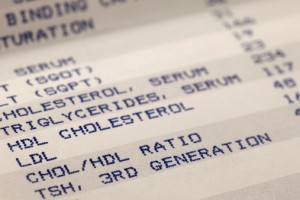High-density lipoprotein (HDL), good cholesterol protects against heart disease and atherosclerosis
 High cholesterol is well-known as a significant risk for heart disease. New research shows keeping cholesterol in a healthy range and boosting good cholesterol will help fight inflammation and thereby reduce joint pain and stiffness. Could get you out walking and resuming activities you really enjoy!
High cholesterol is well-known as a significant risk for heart disease. New research shows keeping cholesterol in a healthy range and boosting good cholesterol will help fight inflammation and thereby reduce joint pain and stiffness. Could get you out walking and resuming activities you really enjoy!
Let’s take a look at cholesterol’s healthy range: high levels of high density lipoprotein (HDL) “good” cholesterol and low levels of low density lipoprotein (LDL) cholesterol. The HDL cholesterol plays a protective role against cardiovascular disease caused by atherosclerosis, the narrowing arteries because of plaque buildup.
Up until now, the way in which HDL cholesterol played this protective role was unknown. Investigators from Germany’s University of Bonn, and an international research team, aimed to determine how HDL affects inflammation in the body, in turn providing the protection against cardiovascular disease.
HDL And LDL Cholesterol Explained
Cholesterol is a substance that is found in all of the cells of your body. There are two main types of cholesterol: Low density lipoprotein (LDL), commonly referred to as “bad” cholesterol and high density lipoprotein (HDL), commonly referred to as “good” cholesterol. High levels of LDL can cause a buildup of plaque in your arteries.
The plaque buildup can lead to a narrowing of the blood vessel which can impede blood flow resulting in coronary artery disease. HDL cholesterol helps to carry LDL cholesterol away from the artery walls back to the liver to be processed. Higher levels of HDL cholesterol will result in lower levels of circulating LDL cholesterol.
High-density lipoprotein (HDL) to stop inflammation
The researchers conducted an extensive three-year study using human and mice cells in an effort to identify which genes are regulated by high HDL levels. With bioinformatic systems – sophisticated software to analyze biological data – they were able to identify the “candidate gene” for further study.
The gene is found in phagocytes. Phagocytes are part of the immune system’s defense system and they work hand in hand with toll-like receptors (TLR). Together they can distinguish between good and bad material in the body. When a bad substance is identified, the TLR trigger an inflammatory response.
Inflammation is the body’s way of signaling a problem, detecting damaged tissue and then repairing it. But sustained or chronic inflammation is dangerous and can lead to blood poisoning or organ failure. The researchers found that high-density HDL levels in the blood help to decrease inflammatory reactions and protect the heart.
The results of this study also open up the possibility of treating other chronic inflammation diseases, such as diabetes, using a molecular approach.
Boost good cholesterol with these tips
Making diet and lifestyle changes can help to boost your HDL cholesterol levels and help to decrease inflammation to a certain extent. Some changes that you can make include:
- Lose weight – if you’re overweight or obese, it can contribute to low HDL cholesterol levels.
- Any amount of weight loss will help.
- Quit smoking – a 15 to 20 percent increase in HDL levels may be seen after quitting.
- Exercise – engaging in aerobic type exercise for 30 minutes a day, five days a week may help to boost your HDL levels by 5 to 10 percent.
- Drink alcohol in moderation – moderate amounts of alcohol help to boost HDL levels.
- Eat healthy – replace saturated fats with mono-unsaturated fats and limit trans fats.
- Increasing your intake of mono-unsaturated fats will not only help to boost HDL levels, it will help to lower LDL levels.
By making diet and lifestyle changes, not only will your HDL levels likely rise, you’ll also experience an array of other health benefits.
-
Solar Energy: Advantages, Disadvantages And Definitions
There are many advantages and disadvantages to going solar. Before yo
-
Lose Weight Fastest
We all know the health benefits associated with getting fit and los
-
Hulahoops and the Circus: Five Fun New Ways to Lose Weight
Some people love to exercise杢hey find ru
-
What Do You Understand By Safe Weight Loss
There is a difference between weight los
-
Use Sexy Panties To Flatter Your Figure
From thongs to boy shorts, French cut to bikinis, sexy panties are
-
Weight Loss Tips You Must Know
Do you tip the scales beyond your ideal
- DON'T MISS
- Dietary Supplement Chitosan Not Yet Proven Effective for Weight Loss
- Low fat diet plan improves mood compared to low carb
- Managing Your Diet To Lose Weight Is Not Dieting
- Emotional Weight: How To Cope Psychological Factors In Weight Control
- A Trouble-free Secret To Assist You To Burn Fat Productively
- Coupons for Medifast
- For Help With Weight Loss And Fat Burning Diet Secrets
- Getting Weight Loss In Four Stages Of Hcg Weight Loss Plan
- Weight Loss Benefit Of Jogging: How To Get Rid Of Love Handles
- The 300 movie workout routine




